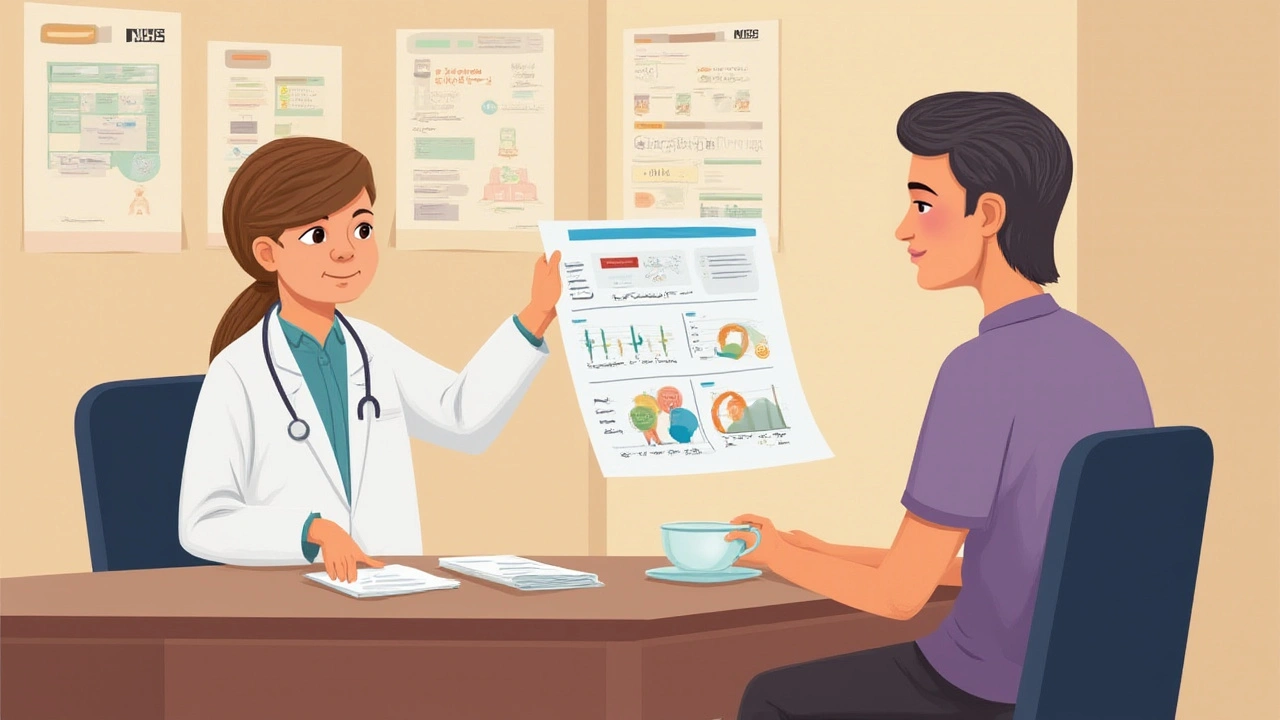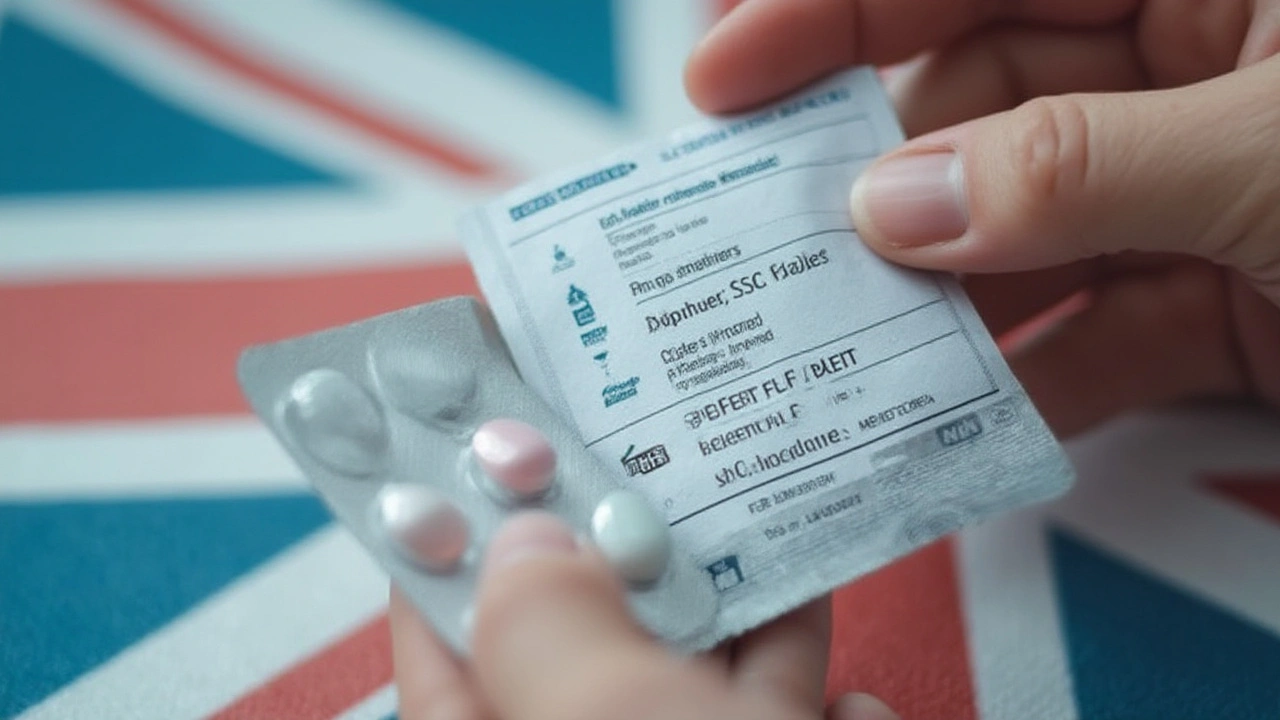Best Metformin Alternatives in the UK NHS: Prescribing, Coverage & Co-Pays Explained
 Jul, 22 2025
Jul, 22 2025
It’s surprising to many how starved the NHS is for variety when it comes to diabetes tablets. If you’ve tried metformin but it’s left you with stomach pain or you simply can’t tolerate it, you’d think the next steps would be simple. But NHS prescribing, coverage, and cost rules make it a proper maze. Doctors aren’t just tossing out the next popular pill; they’ve got cost-effectiveness, NICE guidelines, and clinical commissioning rules breathing down their necks. Meanwhile, patients are left wondering: If I can’t take metformin, what’s actually on offer? And do I have to pay a fortune for a substitute?
The NHS Approach to Diabetes: Prescribing Guidelines For Metformin Alternatives
The NHS loves its rules—especially when they mean spending the least public money possible for the maximum patient benefit. If you look up NICE NG28 guidelines—the Holy Grail for NHS prescribers—it’s clear: Metformin sits right at the top of the list for type 2 diabetes. That’s because it’s dirt cheap, proven to work, and generally safe. But not everyone can take it: about 20% of patients struggle with side effects, like dodgy digestion or persistent nausea.
So, what happens when metformin gets the boot? Step one for GPs and diabetes nurses: go back to the NICE flowchart. The most common metformin alternatives include sulfonylureas (like gliclazide), SGLT2 inhibitors (think dapagliflozin or empagliflozin), DPP-4 inhibitors (such as sitagliptin), and thiazolidinediones (pioglitazone is basically the only one left). Each drug class brings different mechanisms, side-effect risks, and eligibility quirks. For instance, SGLT2 inhibitors help you pee out sugar, but aren’t always suitable for older patients or those at risk for urinary infections. Sulfonylureas are ancient but mighty—they lower blood sugar fast, but can trigger hypoglycaemia and weight gain, which isn’t ideal for most folks with type 2 diabetes who are already fighting the scale.
One huge NHS twist: you can’t just pick any next drug. Your doctor has to justify the choice based on your weight, risk of heart issues, your kidney function (measured as eGFR), plus what’s actually on the local formulary—which is basically the approved shopping list for NHS prescriptions in your corner of the UK. Choices are often restricted. Pioglitazone, for all its benefits, gets stonewalled sometimes due to links with bladder cancer in certain groups. Meanwhile, SGLT2 inhibitors have soared in popularity, especially for people with heart problems—recent studies point to lower risks of heart failure even beyond glucose control.
DPP-4 inhibitors, sometimes called ‘gliptins’, are the polite, quiet workhorses. They’re generally well-tolerated, don’t cause weight gain, and rarely cause hypos. They’re often recommended when metformin isn’t an option (and sulfonylureas are too risky) or in combo with other drugs. Still, NHS cost calculators keep these reserved for those meeting the right criteria; they’re pricier than metformin or gliclazide, but a far cry from the wallet-busters like new injectables.
Curious what your actual alternatives are if metformin is off the menu? Here’s a handy breakdown:
| Drug Class | Examples | Main Pros | Main Cons |
|---|---|---|---|
| Sulfonylureas | Gliclazide, Glimepiride | Cheap, effective | Risk of hypos, weight gain |
| SGLT2 inhibitors | Dapagliflozin, Empagliflozin | Weight loss, heart benefits | Costly, genital infections |
| DPP-4 inhibitors | Sitagliptin, Linagliptin | Well-tolerated, no weight gain | Expensive, less sugar-lowering |
| Thiazolidinediones | Pioglitazone | Cheap, helps insulin resistance | Fluid retention, rare cancer risk |
| GLP-1 agonists* | Semaglutide, Dulaglutide | Weight loss, potent | Injectable, reserved for high-need cases |
*GLP-1s usually need specialist approval and/or severe obesity or risk factors.
If you want a more practical look at drug options, visit this guide on Metformin alternatives UK—it breaks down the latest NHS usage and drug classes in even simpler terms.

Medication Costs, Reimbursement, and Patient Co-Pays For Diabetes Drugs
Contrary to the horror stories across the Atlantic, most prescriptions in the UK won’t sink your bank balance. Still, prescription charges can pile up if you’re not careful, and the devil’s in the details when it comes to NHS reimbursement.
As of 2025, a standard prescription charge per medication in England clocks in at £9.90. That means if you get two types of diabetes tablets and something for blood pressure, you pay for each item—unless you’re exempt. Scotland, Wales, and Northern Ireland remain prescription-charge-free for everyone. Nice perk if you’re north of the border.
For chronic illnesses like diabetes, most patients in England qualify for a medical exemption certificate (FP92A). This magic card wipes your prescription costs to zero, but it’s not automatic—you have to apply, and shocking numbers still don’t.
On the NHS’s end, their big concern is how much they fork out per prescription. Metformin is famously cheap—less than £2 for a month’s supply. DPP-4 inhibitors, by comparison, run closer to £30-£40 a month, while SGLT2 inhibitors and GLP-1 injectables spike higher still. But the NHS has huge bargaining power—prices are heavily negotiated, and you may be unlucky if the drug you need gets left off the local list because it’s pricey or not enough evidence is seen for its extra benefit.
The NHS rarely flat-out refuses a reasonable alternative if you genuinely can’t take metformin, but you’ll have to go through the hoops. Often, doctors start with the cheaper sulfonylurea before moving to pricier options, unless something about your health puts you at risk. NICE guidelines make it clear: glucose control isn’t the only goal—staying safe, healthy, and without too many side effects is a must.
You wouldn’t be out of line for thinking all these drugs are available if you need them, but in reality, your GP might have to request a special approval (“individual funding request”) for something niche. If the Commissioning Group says yes, you’re in luck. If not, you might be offered an alternative you hadn’t considered.
Planning for ongoing medication can be tricky, so here’s a little tip—ask for repeat prescriptions set up via your NHS App or pharmacy. Most GPs offer longer scripts for stable patients, so you only have to faff about every two or three months, not every few weeks.

Real-World Tips For Navigating NHS Diabetes Medication
So, you’re dealing with a metformin intolerance or you just want the facts on UK diabetes medication choices? Here’s the reality: what you get depends on clinical need, local NHS decision-making, and—honestly—a lot of persistence.
First, talk openly with your GP or diabetes nurse if metformin isn’t working out. The more specific you can be about side effects (is it causing cramps, runs, genuine allergies?) the better. Documenting these reactions means your healthcare team can justify an alternative within NHS rules.
Don’t assume the next option will be the fanciest drug. NHS policy is about step-wise escalation: starting with the cheapest (but still effective) alternative before reaching for the newer or more expensive stuff. If you have heart disease or are overweight, you might get bumped up the ladder quicker—SGLT2 inhibitors or GLP-1 mimetics may be on the table earlier due to proven benefits. Always ask about cardiovascular or kidney risks in your case—NHS guidelines now directly link these factors to newer drug eligibility.
Be proactive about exemption certificates. Too many people miss out on free scripts because they assume they don’t qualify or they never bothered with the paperwork. Visit your surgery, ask for a form, and send it in—it’s genuinely worth the hassle.
Worried about which medication you’re prescribed? Request the leaflet for your local formulary (sometimes online, sometimes a printout from your GP). You’ve got a right to see it. If the med you want isn’t listed, your doctor might still apply for it, especially if you’ve tried (and failed with) step one and two drugs. Be thorough—mention genuine side effects, previous hospitalisations, or extra health conditions that might influence the process.
Some NHS areas—especially in cities or academic centres—run specialist diabetes clinics. If things are really tough, ask for referral to one of these. They’re far more familiar with the trickier cases, often able to secure approvals for less usual diabetes drugs.
Remember the NHS is allergic to waste. If a drug doesn’t agree with you, return unused tablets to the pharmacy for safe disposal—never flush them. Unused drugs cost taxpayers over £300 million a year across the UK, enough to pay for thousands of extra treatments if returned properly.
And here’s something not many people know: you can squeeze even more value out of regular medication reviews. Pharmacists increasingly have power to tweak scripts and swap a tablet if you’re struggling, especially for side effects or drug interactions. Don’t be shy about bringing it up at your annual diabetes check.
Metformin alternatives UK is a burning topic for patients and doctors alike in 2025. The good news? Every single person can and should get safe, effective care—just don’t be afraid to push for information and support. The NHS machine is big, but there are ways to work it to your advantage.
Suraj 1120
July 22, 2025 AT 00:30Your post sounds like a half‑baked sales pitch for NHS paperwork.
Shirley Slaughter
July 23, 2025 AT 07:03Reading through the maze of NHS guidelines can feel overwhelming, but remember you’re not alone in this. Many patients have navigated the same hurdles and came out with a regimen that works for them. If metformin gives you stomach trouble, the next step often starts with a sulfonylurea like gliclazide – it’s cheap and effective for many. Should you need something stronger, SGLT2 inhibitors or DPP‑4 inhibitors are options, though they carry higher costs. Don’t forget to apply for the exemption certificate; it can save you a lot of money. Also, keep a diary of your side‑effects – it helps your GP justify a switch. Lastly, use the NHS App to manage repeat prescriptions and avoid unnecessary trips to the pharmacy.
Sean Thomas
July 24, 2025 AT 13:37Honestly, the whole system is a puppet show orchestrated by big pharma and the state to keep us dependent. They’ll throw a cheap sulfonylurea at you, then pat themselves on the back when you finally churn up a hypoglycaemic episode. If you push for a newer agent, you’ll hit a wall of bureaucratic red tape that’s designed to protect their profit margins, not your health. The "individual funding request" is just a smokescreen – most of the time they deny it without a real reason.
Aimee White
July 25, 2025 AT 20:10Picture this: you're stuck in a labyrinth of formularies, each turn guarded by a committee that thinks your gut aches are a myth. The NHS loves its spreadsheets, but it forgets that people actually have bodies that react. When they push SGLT2 inhibitors only for “cardio‑risk” patients, they're basically saying: "If you’re not a high‑risk pal, you’re stuck with cheap pills that may ruin your gut." It’s a classic case of cost‑cutting over patient‑centred care, hidden behind a veneer of clinical guidelines.
Javier Muniz
July 27, 2025 AT 02:43Hey folks, just a quick tip: when you get your exemption form, fill out the "reason for exemption" section with as much detail as possible. Mention any documented nausea, cramping, or even a doctor’s note if you have one. The more concrete evidence you give, the smoother the approval process. Also, don’t be shy about asking for a medication review every six months – your pharmacist can suggest swaps that the GP might not think of.
Sarah Fleming
July 28, 2025 AT 09:17It’s absurd how the Ministry of Health collaborates with pharmaceutical giants to keep us in the dark. They’ll tout "evidence‑based" guidelines while silently suppressing data that shows the long‑term harms of certain drugs. The fact that pioglitazone is sometimes black‑listed despite its efficacy hints at hidden agendas. When they claim "cost‑effectiveness", they ignore the hidden cost of patients’ diminished quality of life, hospital admissions from side‑effects, and the environmental burden of unused pills. Wake up, people – the system is rigged, and the only way out is collective pressure for transparency.
Debra Johnson
July 29, 2025 AT 15:50It is incumbent upon every patient to understand the full spectrum of therapeutic options available within the NHS framework, particularly when metformin intolerance is clinically evident. The first line of alternative therapy, sulfonylureas such as gliclazide, remains a cost‑effective choice, yet their propensity for hypoglycaemia necessitates vigilant glucose monitoring. Should the patient present with comorbid cardiovascular disease, guideline‑directed escalation to an SGLT2 inhibitor-dapagliflozin or empagliflozin-offers both glycaemic control and documented reduction in heart‑failure outcomes. However, the practitioner must weigh the increased risk of genital mycotic infections against these benefits, especially in elderly cohorts with compromised immunity. In instances where weight gain constitutes a therapeutic concern, DPP‑4 inhibitors present a neutral weight profile and a markedly lower hypoglycaemia risk, albeit at a substantially higher price point, which may trigger the need for an individual funding request. Furthermore, the use of thiazolidinediones, principally pioglitazone, should be considered for patients with pronounced insulin resistance, provided renal function is adequate and the individual is not at heightened risk for bladder carcinoma. The clinician must also remain cognizant of the evolving evidence supporting GLP‑1 receptor agonists; while their injectable nature imposes an additional barrier, their robust efficacy in weight reduction and cardiovascular risk mitigation justifies specialist referral when indicated. Throughout this decision‑making process, the practitioner bears the responsibility of securing exemption certificates where applicable, thereby alleviating the financial burden on the patient. It is equally essential to maintain transparent communication regarding formulary limitations, to document adverse reactions meticulously, and to engage in periodic medication reviews in partnership with pharmacy services. Ultimately, the judicious selection of a metformin alternative hinges upon a balance of clinical efficacy, safety profiles, patient‑specific factors, and the economic constraints imposed by the NHS.